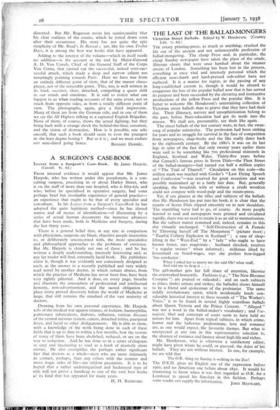A SURGEON'S CASE-BOOK
Leaves from a Surgeon's Case-Book. By James Harpole. (Cassell. 8s. 6d.)
FROM internal evidence it would appear that Mr. James Harpole, who has written under this pseudonym, is a con- sulting surgeon, practising in or about Harley Street, who is on the staff of more than one hospital, who is fifty-ish, and who, before he specialised in operative surgery, had some perhaps brief but invalitable experience of general practice— an experience that ought to be that of every specialist and consultant. In his Leaves from a Surgeon's Case-Book he has adopted the quite legitimate method—since he has altered names and all means of identification—of illustrating by a series of actual human documents the immense advances that have been made, both in Medicine and Surgery, during the last thirty years.
There is a general belief that, at any rate in comparison with physicians, surgeons are blunt, objective people insensitive to, or deliberately unconcerned with, the more speculative and philosophical approaches to the problems of existence. But Mr. HarpOle is clearly not one of these ; and he has written a deeply understanding, intensely interesting and, as any lay reader will find, extremely lucid book. His publishers claim it, though it was evidently not consciously designed as such, as the answer to a recently published and very widely read novel by another doctor, in which certain abuses, from which the practice of Medicine has never been free, have been very rightly pilloried. And it does, on every page, breathe and illustrate the atmosphere of professional and intellectual honesty, non-advertisement, and the sacred obligation to place every proved discovery before the world of Medicine at large, that still remains the standard of the vast majority of doctors.
Drawing from his own personal experience, Mr. Harpole tells of the medical war against tetanus, or lockjaw, haemophilia, pulmonary tuberculosis, diabetes, influenza, various diseases of the central nervous system, cancer, detached retina, puerperal fever, and facial or other disfigurements. He is able to show, with a knowledge of the work being done in each of these fields that is up to date to within a few months, how the terrors of many of them have been abolished, reduced, or are on the way to reduction. And he has done so in a series of chapters as easy and fascinating to read as a book of masterly short stories. He also exemplifies the perhaps rather significant fact that doctors as a whole—men who are more intimately in contact, perhaps, than any others with the seamier and more tragic sides of life—are seldom pessimists. It is to be hoped that a rather undistinguished and hackneyed type of title will not prove a handicap to one of the very best books of its kind that has appeared for many years.
H. H. BAMFORD.









































 Previous page
Previous page